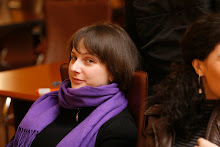Political woes damage tourism
 Although there is still one month before the end of summer, prominent figures of the Georgian tourism industry agree that the period has been far below satisfactory. The last August war, four months of opposition protests and the global economic crisis have resulted in the industry’s financial woes.
Although there is still one month before the end of summer, prominent figures of the Georgian tourism industry agree that the period has been far below satisfactory. The last August war, four months of opposition protests and the global economic crisis have resulted in the industry’s financial woes.However, Georgian Tourism Department Chief Petre Kankava remains optimistic. His official statistics reveal that 600,000 tourists visited Georgia in the first 6 months of 2009 whereas 1.3 million tourists visited the country in 2008.
Kankava said June was the month when the most tourists crossed the border into Georgia – most coming from Azerbaijan and Turkey. Israelis, Ukrainians and Russians have been frequent visitors. German, British, Greek, Bulgarian, Baltic and Philippine citizens are also steadily visiting Georgia.
Compared with the same period last year, the rate shows an 11.7-percent decrease in the flow of tourists or 15,000 fewer visitors. Kankava considers the outcome a solid achievement although most tourists came in June. The Tourism Department considers everyone who crosses the border a tourist regardless of their purpose for entering the country.
“The purpose of their visit does not matter,” Kankava said. “Every foreigner stops at a hotel, eats out, buys souvenirs and spends money. That is tourism.”
Tourism Management Educational Center head at Ilia Chavchavadze State University Koba Arabuli does not agree with Kankava. He defines tourists as people “who arrives in the country for holidays, have leisure time, spend money, see the country and go back to the homeland for a week or two.”
“Individuals who have businesses, work officially or arrive for other reasons cannot be counted as tourists,” Arabuli said, adding that the presented figures are based on statistics from the Border Department, which count every individual crossing the border, including Georgians with foreign citizenship.
Meanwhile, tour agencies are voicing complaints about the fall in the number of customers.
Manana Tsiramua, director of the Georgian Holiday tour operator, works primarily on the Hong Kong, UK, Latvia and Ukraine markets. She said the four-month opposition protests have led to the downturn in addition to the August war.
“If last year we were serving 5-6 groups at the same time, now we have just one, and instead of 40-member groups, now we have just 6-10 tourists coming together,” Tsiramua said. “When foreigners were planning their vacations and booking tours, they read about the protests and unstable atmosphere in the country and opted against going to Georgia.”
Statistics aside, Gabriel Heim and Brigitta Monthey recently visited Tbilisi for an 8-day holiday from Berlin.
“Personally, I do not believe that the political situation is a reason to refuse going to the region, but foreigners should have more information about how easy, welcoming and friendly the country is,” Heim said.
Monthey added that they found information about the country on the Web. She also expressed a desire to learn more about politics in the country and cultural and tourist opportunities.
Kankava has launched activities to promote Georgia’s tourism opportunities abroad in light of the decreasing numbers of visitors to the country.
The department has opened the first modern tourist center in Tbilisi, equipped with new maps, booklets and guides. Five similar centers are pending to open in surrounding regions.
For international promotion, the government has allocated 180,000 euro to the department. Some funds will be spent on a film about Georgia travel opportunities, which will be produced and broadcast on Buzz TV and Spanish and English channels. The department will also participate in international exhibitions that Kankava hopes will attract more people.
“The war has strongly damaged our reputation and we are trying hard to correct it,” he said. “Europe started here.”
Arabuli disagrees, stating that Georgia has no strategy for tourism development — only a general concept.
“The president and economics minister publicly state that tourism is a priority issue, but I do not see what they are doing to prove this,” Arabuli said. “If they mean rebuilding cities, then this is not a tourism strategy. This sphere needs thorough planning and implementation, and all above more finances than there are now.”
Arabuli agrees that training and education are lacking in the department. He said the department holds periodic training for hotel owners, but realizes this is not enough.
“Prices are high and service is low,” Kankava said. “People do not understand that the hotel business is not just a matter of buying and selling. It requires working for years to achieve high quality and attract tourists. They do not understand that bad service damages the country’s image.”
Anna Chichinadze
31.07.2009








No comments:
Post a Comment